Soy in the News
In the past few years, soy has gotten a terrible reputation. It has been positioned in society as some sort of evil, unhealthy plant. Americans hold onto this belief that soy has estrogens that could trigger breast cancer in women and…breasts in men?! Certain industries, cough cough, big meat and dairy have not helped with these rumors. Given that these industries have an enormous amount of influence over what we read about in the news, you can’t blame someone for thinking this is true. The advice that soy is bad for you and should be eaten only in moderation or not at all is a widely held idea and can even be reinforced by our very own doctors (1). The anti-soy movement has also been fueled by the Weston A. Price Foundation (particularly an article written by Sally Fallon and Mary Enig, Ph.D. titled, “Tragedy and Hype") (2) who want Americans to eat meat and dairy products by avoiding soy milk and soy proteins (tofu, tempeh, edamame, soy curls, etc.) The Price Foundation states, “Soy phytoestrogens disrupt endocrine function and have the potential to cause infertility and to promote breast cancer in adult women (3).” However, it is actually the phytoestrogens in soy that make this plant so desirable for one’s health. The phytoestrogens work as blockers against the “bad for you” estrogen from entering your system. Soy estrogens decrease the estrogen response as true estrogens help to generate breast cancer (4).

Power in Plants
The soybean is a powerful legume that has been shown to promote breast health, bone preservation, and reduce the risk of coronary disease and prostate cancer. Soy has been known to reduce hot flashes, alleviate depressive symptoms, and even improve skin health (5). Soybeans should be consumed in their organic, whole-food form (not isolated soy proteins) (6).
-
Breast Cancer - Soy does not cause or accelerate cancers in men or women; it actually has estrogen-blocking compounds (7). Researchers curious about people who eat soy products daily conducted a meta-analysis in 2008 analyzing the diets of Asians and Asian Americans. This diet was rich in tofu, tempeh, miso, soy milk, etc. Participants who consumed high soy diets, showed a 29% decreased risk of breast cancer (8). A separate analysis with 11,206 participants showed that women who already had cancer treatments greatly reduced their chances of dying from cancer by adding soy to their diets. Researchers reported a 25-30% reduction in cancer coming back (9). Keep in mind, that the outcome of preventing breast cancer is even higher when following a whole food/plant-based diet and by curbing alcohol consumption. A woman’s breast cancer risk can increase by as much as 41% when consuming 2-5 drinks a day compared to women who do not drink (10). Alcohol is incredibly common in our society, however, it is good to keep in mind that it’s a class 1 carcinogen (11). 90-95% of breast cancer cases are brought on by diet and lifestyle choices and not by a genetic predisposition (12). As for the genes which are out of our control, only 5 to 10 percent of all breast cancer comes from an inherited gene mutation. Normal BRCA (breast cancer) genes can help to fight off cancer when it hits the body. However, if the BRCA genes are mutated or broken, they can be passed down within the family (13).
-
Menopause - The WAVS study (Women’s Study for the Alleviation of Vasomotor Symptoms) conducted in 2021, showed that postmenopausal women reporting two or more hot flashes a day reduced their hot flashes by changing their diet over a 12-week period. Women were randomly assigned to either an intervention group which consisted of eating a low-fat, vegan diet including ½ cup of cooked soybeans daily, or, to a control group which did not consist of any diet changes at all. The results were outstanding. The group fed a low-fat vegan diet with soybeans experienced an 84% drop in menopausal symptoms (14).

Milk Does Not Do a Body Good
Dr. Michael Klaper, M.D. says, “The purpose of cow’s milk is to turn a 65-pound calf into a 700-pound cow as rapidly as possible. Cow’s milk is baby calf growth fluid. No matter what you do to it, that is what the stuff is (15).” So, even if the world is getting on board with more plant-based milks (which is great!), we still consume dairy products at an astronomical rate via cheese, yogurt, ice cream, butter, etc. One study in Japan showed that potent, active female hormones were brought on shortly after drinking dairy milk (16). Men, women, and younger boys were given 2 large glasses of milk, and urine samples were then taken every 15 minutes afterward. This study showed very concerning outcomes as the men's and boys’ levels of testosterone plummeted after minutes of drinking the milk. Concluding the research, the study stated, “The present data on men and children indicate that estrogens in milk were absorbed, and gonadotropin secretion was suppressed, followed by a decrease in testosterone secretion. Sexual maturation of prepubertal children could be affected by the ordinary intake of cow milk (17).” As for the male breasts concerns, soy is not the problem here. Dairy is pumping out estrogen which men and women both respond to. In men, when there is some breast development, it’s usually due to a bodyweight issue that stems from poor diet choices. The fat cells in the body convert testosterone to estrogen. As for prostate cancer, even though there is less research than breast cancer, adding soybeans to a diet has shown improved outcomes in people with prostate cancers (18).

Get Your Soy Intake at P.S. & Co.
-
Organic Breakfast Tacos with tofu scramble - new to the menu! Enjoy 3 corn tortillas filled with tofu scramble, black beans, our rawcho cheese made with cashews and chickpea miso, chimichurri, and more.
-
Organic Hand-Cut Nachos with optional added tofu scramble - also a new menu addition. You won’t find a boring, dry nacho on this platter. It’s topped with brown rice tortilla chips, black beans, rawcho cheese, chimichurri, jalapenos, guacamole, and more.
-
Organic Spicy BBQ Tempeh Kale Caesar Salad - this nutrient-dense salad is filling, and nourishing, and is full of ingredients such as lacinato kale, marinated tempeh, and house-made Caesar dressing made from cashews and hand-pressed Brazil nut milk, pickled onions, and more.
1. Sundermann, Melissa MD. (June 23, 2022). This Doctor Googled Her Way to a Dream Job
[audio podcast]. Plantstrong with Rip Esselstyn.
2. Fallon, Sally & Enig, Mary PhD, First published in Nexus Magazine, Volume 7, Number 3, April-May, 2000.
3. Soy alert! The Weston A. Price Foundation. (n.d.). Retrieved July 7, 2022, from https://www.westonaprice.org/soy-alert/
4. Mostrom, M. & Evans, TJ. Phytoestrogens. Reproductive and Developmental Toxicology, 2011.
5. Messina M. Soy and Health Update: Evaluation of the Clinical and Epidemiologic Literature. Nutrients. 2016 Nov 24;8(12):754. doi: 10.3390/nu8120754. PMID: 27886135; PMCID: PMC5188409.
6. Sundermann, Melissa MD. (June 23, 2022). This Doctor Googled Her Way to a Dream Job
[audio podcast]. Plantstrong with Rip Esselstyn.
7. Chi F, Wu R, Zeng YC, Xing R, Liu Y, Xu ZG. Post-diagnosis soy food intake and breast cancer survival: a meta-analysis of cohort studies. Asian Pac J Cancer Prev. 2013;14(4):2407-12. doi: 10.7314/apjcp.2013.14.4.2407. PMID: 23725149.
8. Wu AH, Yu MC, Tseng CC, Pike MC Epidemiology of soy exposures and breast cancer risk. Br J Cancer. 2008;98:9-14.
Carroll, Chuck, (Dr. Neal Barnard, MD, FACC). (2021, July 21). Is Soy Healthy? Here's The Truth (Dr. Neal Barnard on The Exam Room) [audio podcast episode], Physicians Committee, Exam Room Podcast.
9. Meta-analysis of 5 cohort studies, 11,206 participants. Chi F. Asian Pacific J Cancer Prev. 2013;14:2407-2412.
Carroll, Chuck, (Dr. Neal Barnard, MD, FACC). (2021, July 21). Is Soy Healthy? Here's The Truth (Dr. Neal Barnard on The Exam Room) [audio podcast episode], Physicians Committee, Exam Room Podcast.
10. Smith-Warner SA, Spiegelman D, Yuan S-S, et al. “Alcohol and breast cancer in women. A pooled analysis of cohort studies.” JAMA 279 (1998): 535-540.
Campbell, T. Colin PhD, and Thomas M. Campbell II. The China Study: Startling Implications For Diet, Weight Loss And Long-Term Health. (BenBella Books Inc., 2006), 281.
11. Known and probable human carcinogens. American Cancer Society. (n.d.). Retrieved July 7, 2022, from https://www.cancer.org/healthy/cancer-causes/general-info/known-and-probable-human-carcinogens.html
12. Anand P, Kunnumakkara AB, Sundaram C, Harikumar KB, Tharakan ST, Lai OS, Sung B, Aggarwal BB. Cancer is a preventable disease that requires major lifestyle changes. Pharm Res. 2008 Sep;25(9):2097-116. doi: 10.1007/s11095-008-9661-9. Epub 2008 Jul 15. Erratum in: Pharm Res. 2008 Sep;25(9):2200. Kunnumakara, Ajaikumar B [corrected to Kunnumakkara, Ajaikumar B]. PMID: 18626751; PMCID: PMC2515569.
90% fewer breast cancer cases? it's possible. here's how.: Dr. Kristi Funk. Physicians Committee for Responsible Medicine. (n.d.). Retrieved July 7, 2022, from https://www.pcrm.org/news/exam-room-podcast/90-fewer-breast-cancer-cases-its-
possible-heres-how-dr-kristi-funk
13. Danahy, A., Panoff, L., Funk, D. K., Levo, K., Underwood, C., Griess, B., Ciel, Rodriguez, K., Delgado, R., Carmichael, D., Carson, Ely, L. M., & Annemarie. (2021, November 16). BRCA gene mutations. Pink Lotus. Retrieved July 7, 2022, from https://pinklotus.com/powerup/breastcancer101/brca-gene-mutations/
14. Barnard ND, Kahleova H, Holtz DN, Del Aguila F, Neola M, Crosby LM, Holubkov R. The Women's Study for the Alleviation of Vasomotor Symptoms (WAVS): a randomized, controlled trial of a plant-based diet and whole soybeans for postmenopausal women. Menopause. 2021 Jul 12;28(10):1150-1156. doi: 10.1097/GME.0000000000001812. PMID:
34260478; PMCID: PMC8462449.
Sundermann, Melissa MD. (June 23, 2022). This Doctor Googled Her Way to a Dream Job
[audio podcast]. Plantstrong with Rip Esselstyn.
15. Dairy. Michael Klaper, MD. (n.d.). Retrieved July 7, 2022, from https://www.doctorklaper.com/dairy-free
16. Maruyama K, Oshima T, Ohyama K. Exposure to exogenous estrogen through intake of commercial milk produced from pregnant cows. Pediatr Int. 2010 Feb;52(1):33-8. doi: 10.1111/j.1442-200X.2009.02890.x. Epub 2009 May 22.
PMID: 19496976.
Dairy. Michael Klaper, MD. (n.d.). Retrieved July 7, 2022, from https://www.doctorklaper.com/dairy-free
17. ibid.
18. Messina M. Soy and Health Update: Evaluation of the Clinical and Epidemiologic Literature. Nutrients. 2016 Nov 24;8(12):754. doi: 10.3390/nu8120754. PMID: 27886135; PMCID: PMC5188409.
Rizzo G, Baroni L. Soy, Soy Foods and Their Role in Vegetarian Diets. Nutrients. 2018 Jan 5;10(1):43. doi: 10.3390/nu10010043. PMID: 29304010; PMCID: PMC5793271.





Leave a comment
This site is protected by hCaptcha and the hCaptcha Privacy Policy and Terms of Service apply.